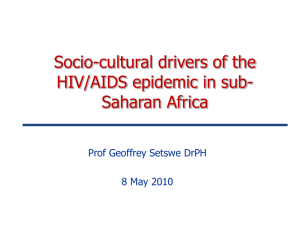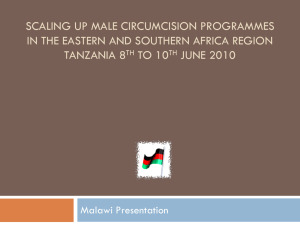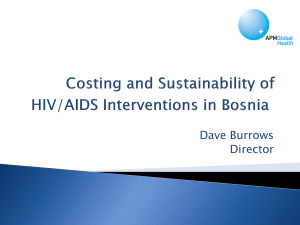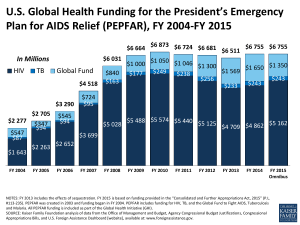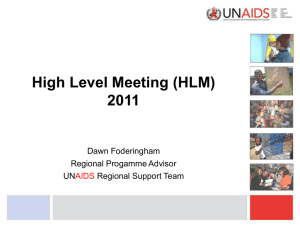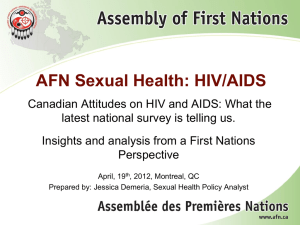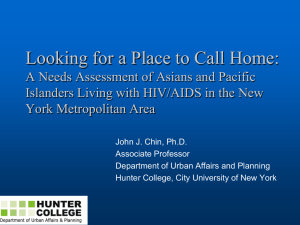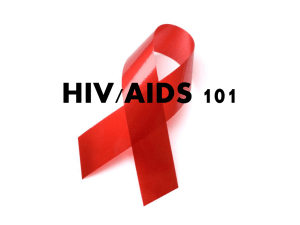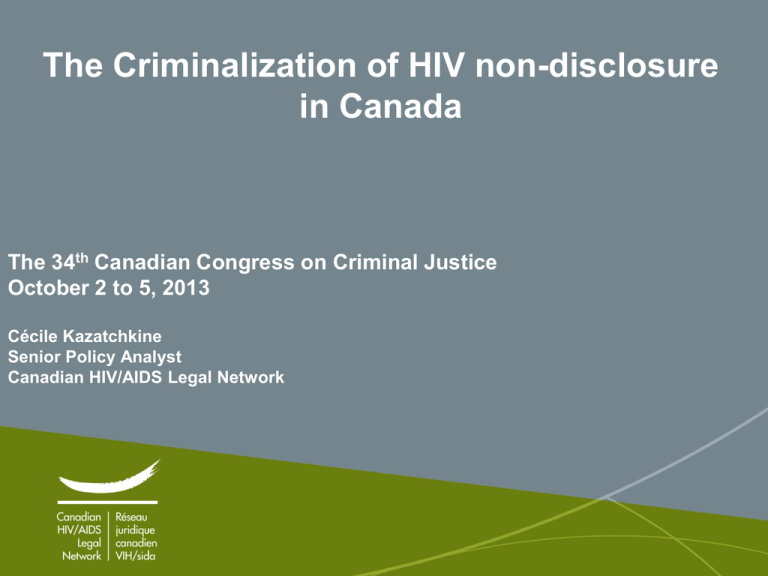
The Criminalization of HIV non-disclosure
in Canada
The 34th Canadian Congress on Criminal Justice
October 2 to 5, 2013
Cécile Kazatchkine
Senior Policy Analyst
Canadian HIV/AIDS Legal Network
1
About the Canadian HIV/AIDS Legal Network
The Canadian HIV/AIDS Legal Network (www.aidslaw.ca) promotes the
human rights of people living with and vulnerable to HIV/AIDS, in
Canada and internationally, through research, legal and policy analysis,
education, and community mobilization. The Legal Network is Canada’s
leading advocacy organization working on the legal and human rights
issues raised HIV/AIDS.
2
Starting point: The Cuerrier decision in 1998
Non-disclosure may amount to fraud vitiating consent and thus
transform consensual sex into a (sexual) assault when:
non-disclosure exposed an individual to a “significant risk” of
serious bodily harm (i.e., a significant risk of HIV transmission); and
the individual would not have consented to sex had he/she known
of his/her sexual partner’s HIV status.
There is an “aggravated” assault when a (sexual) assault endangers
the individual’s life.
3
2012: Two cases before the Supreme Court
of Canada
CA Manitoba decision in R. v. Mabior:
proper use of condom or undetectable viral load decreases
risk to the point where it is not “significant.”
CA Quebec decision in R. v. D.C.:
single instance of unprotected vaginal intercourse, where the
accused woman had an undetectable viral load, is not a
“significant risk.”
4
Mabior and D.C., SCC 2012:
People have a duty to disclose before having sex that poses “a
realistic possibility of HIV transmission.”
Not disclosing in such circumstances means a person could be
convicted of aggravated sexual assault.
No need for actual transmission. The crime is about nondisclosure.
5
Mabior and D.C. 2012 SCC decisions: a
major step backward
In the Court’s view, almost any risk is considered a “realistic possibility of
HIV transmission.”
Using a condom OR having a low viral load is not sufficient to preclude
criminal liability in cases of HIV non-disclosure before vaginal sex.
It is only where a condom is used AND the HIV-positive partner’s viral
load is low that there is no duty to disclose before vaginal sex under the
criminal law.
6
Mabior and D.C. 2012 SCC decisions
No distinction between silence and a lie.
No distinction based on the circumstances of a particular
encounter, including the type of relationship.
People can be prosecuted even if they had no intent to harm
their partner.
People can be charged with aggravated sexual assault for not
disclosing their status.
7
Perpetuating injustice
“What a terrible irony that we have come to a place where the
medications we fought for will allow us to live a relatively
‘normal’ quality of life and now we are going to go to jail for
doing so.”
— Louise Binder, “No test, no arrest: criminal laws to fuel
another HIV epidemic,” OpenDemocracy.net, July 27, 2012
8
Perpetuating injustice
A failure to appropriately take into account the science related to
HIV.
A disproportionate and overly-broad use of the criminal law.
A potential disproportionate impact on the most vulnerable.
Remaining uncertainties to be tested on the backs of people
living with HIV.
9
Poor public policy
HIV criminalization and public health
What do international experts say?
UNAIDS, Ending overly broad criminalisation of HIV non-disclosure, exposure
and transmission: Critical scientific, medical and legal considerations, 2013
10
Recent legal developments
Two Court of Appeal decisions in Ontario (R. v. M and R. v. F: 2013
ONCA 414; 2013 ONCA 415)
“Mabior does not suggest that expert evidence of the basic risk of
HIV transmission for intercourse will be required in every case to
ground a conviction for aggravated sexual assault arising from
unprotected acts of intercourse – anal or vaginal – with an HIV–
positive partner. Rather, Mabior holds that a realistic possibility of
transmission of HIV is negated by evidence that condom
protection was used and the accused’s viral load was low at the
time of intercourse.” (R. v. F. at para. 53)
11
Real life stories: Guilty plea in Yellowknife,
Sentencing April 2013
After spending two years in pre-trial detention, a 27-year-old Aboriginal
man pled guilty to two counts of aggravated sexual assault in
Yellowknife for not disclosing his status to two women. In one instance
a condom was used. In the other instance neither the accused nor the
complainant could remember if a condom was used because they were
both too drunk. Neither of the complainants was infected. The young
man was sentenced to more than 3 years in prison. He is now
registered as a sexual offender for life.
12
Real life stories: J.M. Case, Barrie, Ontario,
Summer 2013
For immediate release
COURTHOUSE PROTESTORS CONDEMN “WITCH-HUNT” BY CROWN
PROSECUTORS AGAINST PEOPLE LIVING WITH HIV, CALL FOR
ACTION BY ATTORNEY GENERAL
TORONTO, July 8, 2013 —AIDS activists, feminists and legal experts are
gathering today at the Barrie Courthouse to protest the unjust criminal
prosecution of Ontario woman “JM.” JM faces one of the most serious
charges under the Criminal Code — aggravated sexual assault — for
allegedly not disclosing her HIV-positive status during sexual activity that
carried little or no risk of transmission.
13
Challenging the law; Challenging Crown
practices
14
Resources exist for people living with HIV, lawyers
and service providers
For more information on HIV criminalization contact the Canadian
HIV/AIDS Legal Network (www.aidslaw.ca)
Resource kit for defence lawyers available at
www.aidslaw.ca/EN/lawyers-kit. Lawyers can also contact the Legal
Network
Community kit HIV disclosure and the law at
www.aidslaw.ca/EN/community-kit.
15
Thank you!
Canadian HIV/AIDS Legal Network: www.aidslaw.ca
Ontario Working Group on criminal and HIV exposure: www.chle.ca
Cecile Kazatchkine
Senior Policy Analyst
Canadian HIV/AIDS Legal Network
Phone : +1 416 595-1666 (ext. 231) ckazatchkine@aidslaw.ca
16

